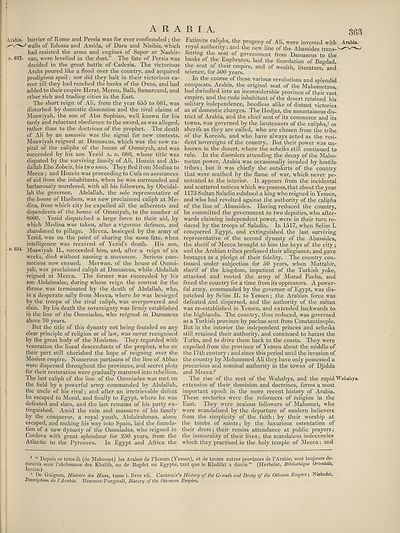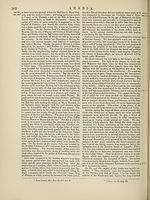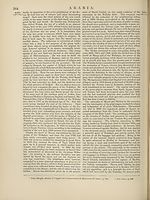Encyclopaedia Britannica > Volume 3, Anatomy-Astronomy
(371) Page 363
Download files
Complete book:
Individual page:
Thumbnail gallery: Grid view | List view

A R A
Arabia, barrier of Rome and Persia was for ever confounded ; the
walls of Edessa and Amida, of Dara and Nisibis, which
had resisted the arms and engines of Sapor or Nashir-
i). 637* van, were levelled in the dust.” The fate of Persia was
decided in the great battle of Cadesia. The victorious
Arabs poured like a flood over the country, and acquired
prodigious spoil; nor did they halt in their victorious ca¬
reer till they had reached the banks of the Oxus, and had
added to their empire Herat, Merou, Balk, Samarcand, and
other rich and trading cities in the East.
The short reign of Ali, from the year 655 to 661, was
disturbed by domestic dissension and the rival claims of
Moawiyah, the son of Abu Sophian, well known for his
tardy and reluctant obedience to the sword, as was alleged,
rather than to the doctrines of the prophet. The death
of Ali by an assassin was the signal for new contests.
Moawiyah reigned at Damascus, which was the new ca¬
pital of the caliphs of the house of Ommiyah, and was
succeeded by his son Yezid a. d. 680, whose title was
disputed by the surviving family of Ali, Hozein and Ab¬
dallah Ebn Zobeir, his two sons. They fled from Medina to
Mecca ; and Hozein was proceeding to Cufa on assurances
of aid from the inhabitants, when he was surrounded and
barbarously murdered, with all his followers, by Obeidal-
lah the governor. Abdallah, the sole representative of
the house of Hashem, was now proclaimed caliph at Me¬
dina, from which city he expelled all the adherents and
dependents of the house of Ommiyah, to the number of
8000. Yezid dispatched a large force to their aid, by
which Medina was taken, after a vigorous defence, and
abandoned to pillage. Mecca, besieged by the army of
Yezid, was on the point of sharing the same fate, when
intelligence was received of Yezid’s death. His son,
. d. 084. Moawiyah II., succeeded him, and, after a reign of six
weeks, died without naming a successor. Serious com¬
motions now ensued. Merwan, of the house of Ommi¬
yah, was proclaimed caliph at Damascus, while Abdallah
reigned at Mecca. The former was succeeded by his
son Abdalmalac, during whose reign the contest for the
throne was terminated by the death of Abdallah, who,
in a desperate sally from Mecca, where he was besieged
by the troops of the rival caliph, was overpowered and
slain. By his death the sovereignty was firmly established
in the line of the Ommiades, who reigned in Damascus
above 70 years.
But the title of this dynasty not being founded on any
clear principle of religion or of law, was never recognised
by the great body of the Moslems. They regarded with
veneration the lineal descendants of the prophet, who on
their part still cherished the hope of reigning over the
Moslem empire. Numerous partisans of the line of Abbas
were dispersed throughout the provinces, and secret plots
for their restoration were gradually matured into rebellion.
The last caliph of the line of the Ommiades was met on
the field by a powerful army commanded by Abdallah,
the uncle of his rival ; and after an irretrievable defeat
he escaped to Mosul, and finally to Egypt, where he was
defeated and slain, and the last remains of his party ex¬
tinguished. Amid the ruin and massacre of his family
by the conqueror, a royal youth, Abdalrahman, alone
escaped, and making his way into Spain, laid the founda¬
tion of a new dynasty of the Ommiades, who reigned in
Cordova with great splendour for 250 years, from the
Atlantic to the Pyrenees. In Egypt and Africa the
B 1 A- 363
Fatimite caliphs, the progeny of Ali, were invested with Arabia,
loyal authority; and the new line of the Abassides trans-^^^^
fernng the seat of government from Damascus to the
banks of the Euphrates, laid the foundation of Bagdad,
the seat of their empire, and of wealth, literature, and
science, for 500 years.
In the course of these various revolutions and splendid
conquests, Arabia, the original seat of the Mahometans,
had dwindled into an inconsiderable province of their vast
empire, and the rude inhabitant of the desert retained his
solitary independence, heedless alike of distant victories
as of domestic changes. The Hedjaz, the mountainous dis¬
trict of Arabia, and the chief seat of its commerce and its
towns, was governed by the lieutenants of the caliphs,1 or
sherifs as they are called, who are chosen from the tribe
of the Koreish, and who have always acted as the resi¬
dent'sovereigns of the country. But their power was un¬
known in the desert, where the scheiks still continued to
rule. In the disorders attending the decay of the Maho¬
metan power, Arabia was occasionally invaded by hostile
tribes; but it was chiefly the outskirts of the country
that were scathed by the flame of war, which never pe¬
netrated to the interior. It appears from the incidental
and scattered notices which we possess, that about the year
1173 Sultan Saladin subdued a king who reigned in Yemen,
and who had revolted against the authority of the caliphs
of the line of Abassides. Having reduced the country,
he committed the government to two deputies, who after¬
wards claiming independent power, were in their turn re¬
duced by the troops of Saladin. In 1517, when Selim I.
conquered Egypt, and extinguished the last surviving
representative of the second dynasty of the Abassides,
the sherif of Mecca brought to him the keys of the city ;
and the Arabian tribes professed their allegiance, and gave
hostages as a pledge of their fidelity. The country con¬
tinued under subjection for 50 years, when Muttahir,
sherif of the kingdom, impatient of the Turkish yoke,
attacked and routed the army of Murad Pacha, and
freed the country for a time from its oppressors. A power¬
ful army, commanded by the governor of Egypt, was dis¬
patched by Selim II. to Yemen; the Arabian force was
defeated and dispersed, and the authority of the sultan
was re-established in Yemen, and extended backwards to
the highlands. The country, thus reduced, was governed
as a Turkish province by pachas sent from Constantinople.
But in the interior the independent princes and scheiks
still retained their authority, and continued to harass the
Turks, and to drive them back to the coasts. They were
expelled from the province of Yemen about the middle of
the 17th century; and since this period until the invasion of
the country by Mohammed Ali they have only possessed a
precarious and nominal authority in the towns of Djidda
and Mecca.2
The rise of the sect of the Wahabys, and the rapid Wahabys.
extension of their dominion and doctrines, forms a most
important epoch in the more recent history of Arabia.
These sectaries were the reformers of religion in the
East. They were zealous followers of Mahomet, who
were scandalized by the departure of modern believers
from the simplicity of the faith; by their worship at
the tombs of saints; by the luxurious ostentation of
their dress; their remiss attendance at public prayers;
the immorality of their lives; the scandalous indecencies
which they practised in the holy temple of Mecca; and
1 “ Depuis ce tems-la (de Mahomet) les Arabes de Piemen (Yemen), et de toutes autres provinces de PArabic, sont toujours de-
meure's sous Pobeissance des Khalits, ou de liagdet ou Egypte, tant que le Khalifat a duree.” (Herbelot, Blbliotheque Orientate,
laman.)
2 De Guignes, Histoire des Huns, tome i. livre vii. Cantemir’s History of the Growth and Decay of the Othman Empire', Niebuhr,
Description de VArabic. Hanimer-Purgstall, History of the Ottoman Empire.
Arabia, barrier of Rome and Persia was for ever confounded ; the
walls of Edessa and Amida, of Dara and Nisibis, which
had resisted the arms and engines of Sapor or Nashir-
i). 637* van, were levelled in the dust.” The fate of Persia was
decided in the great battle of Cadesia. The victorious
Arabs poured like a flood over the country, and acquired
prodigious spoil; nor did they halt in their victorious ca¬
reer till they had reached the banks of the Oxus, and had
added to their empire Herat, Merou, Balk, Samarcand, and
other rich and trading cities in the East.
The short reign of Ali, from the year 655 to 661, was
disturbed by domestic dissension and the rival claims of
Moawiyah, the son of Abu Sophian, well known for his
tardy and reluctant obedience to the sword, as was alleged,
rather than to the doctrines of the prophet. The death
of Ali by an assassin was the signal for new contests.
Moawiyah reigned at Damascus, which was the new ca¬
pital of the caliphs of the house of Ommiyah, and was
succeeded by his son Yezid a. d. 680, whose title was
disputed by the surviving family of Ali, Hozein and Ab¬
dallah Ebn Zobeir, his two sons. They fled from Medina to
Mecca ; and Hozein was proceeding to Cufa on assurances
of aid from the inhabitants, when he was surrounded and
barbarously murdered, with all his followers, by Obeidal-
lah the governor. Abdallah, the sole representative of
the house of Hashem, was now proclaimed caliph at Me¬
dina, from which city he expelled all the adherents and
dependents of the house of Ommiyah, to the number of
8000. Yezid dispatched a large force to their aid, by
which Medina was taken, after a vigorous defence, and
abandoned to pillage. Mecca, besieged by the army of
Yezid, was on the point of sharing the same fate, when
intelligence was received of Yezid’s death. His son,
. d. 084. Moawiyah II., succeeded him, and, after a reign of six
weeks, died without naming a successor. Serious com¬
motions now ensued. Merwan, of the house of Ommi¬
yah, was proclaimed caliph at Damascus, while Abdallah
reigned at Mecca. The former was succeeded by his
son Abdalmalac, during whose reign the contest for the
throne was terminated by the death of Abdallah, who,
in a desperate sally from Mecca, where he was besieged
by the troops of the rival caliph, was overpowered and
slain. By his death the sovereignty was firmly established
in the line of the Ommiades, who reigned in Damascus
above 70 years.
But the title of this dynasty not being founded on any
clear principle of religion or of law, was never recognised
by the great body of the Moslems. They regarded with
veneration the lineal descendants of the prophet, who on
their part still cherished the hope of reigning over the
Moslem empire. Numerous partisans of the line of Abbas
were dispersed throughout the provinces, and secret plots
for their restoration were gradually matured into rebellion.
The last caliph of the line of the Ommiades was met on
the field by a powerful army commanded by Abdallah,
the uncle of his rival ; and after an irretrievable defeat
he escaped to Mosul, and finally to Egypt, where he was
defeated and slain, and the last remains of his party ex¬
tinguished. Amid the ruin and massacre of his family
by the conqueror, a royal youth, Abdalrahman, alone
escaped, and making his way into Spain, laid the founda¬
tion of a new dynasty of the Ommiades, who reigned in
Cordova with great splendour for 250 years, from the
Atlantic to the Pyrenees. In Egypt and Africa the
B 1 A- 363
Fatimite caliphs, the progeny of Ali, were invested with Arabia,
loyal authority; and the new line of the Abassides trans-^^^^
fernng the seat of government from Damascus to the
banks of the Euphrates, laid the foundation of Bagdad,
the seat of their empire, and of wealth, literature, and
science, for 500 years.
In the course of these various revolutions and splendid
conquests, Arabia, the original seat of the Mahometans,
had dwindled into an inconsiderable province of their vast
empire, and the rude inhabitant of the desert retained his
solitary independence, heedless alike of distant victories
as of domestic changes. The Hedjaz, the mountainous dis¬
trict of Arabia, and the chief seat of its commerce and its
towns, was governed by the lieutenants of the caliphs,1 or
sherifs as they are called, who are chosen from the tribe
of the Koreish, and who have always acted as the resi¬
dent'sovereigns of the country. But their power was un¬
known in the desert, where the scheiks still continued to
rule. In the disorders attending the decay of the Maho¬
metan power, Arabia was occasionally invaded by hostile
tribes; but it was chiefly the outskirts of the country
that were scathed by the flame of war, which never pe¬
netrated to the interior. It appears from the incidental
and scattered notices which we possess, that about the year
1173 Sultan Saladin subdued a king who reigned in Yemen,
and who had revolted against the authority of the caliphs
of the line of Abassides. Having reduced the country,
he committed the government to two deputies, who after¬
wards claiming independent power, were in their turn re¬
duced by the troops of Saladin. In 1517, when Selim I.
conquered Egypt, and extinguished the last surviving
representative of the second dynasty of the Abassides,
the sherif of Mecca brought to him the keys of the city ;
and the Arabian tribes professed their allegiance, and gave
hostages as a pledge of their fidelity. The country con¬
tinued under subjection for 50 years, when Muttahir,
sherif of the kingdom, impatient of the Turkish yoke,
attacked and routed the army of Murad Pacha, and
freed the country for a time from its oppressors. A power¬
ful army, commanded by the governor of Egypt, was dis¬
patched by Selim II. to Yemen; the Arabian force was
defeated and dispersed, and the authority of the sultan
was re-established in Yemen, and extended backwards to
the highlands. The country, thus reduced, was governed
as a Turkish province by pachas sent from Constantinople.
But in the interior the independent princes and scheiks
still retained their authority, and continued to harass the
Turks, and to drive them back to the coasts. They were
expelled from the province of Yemen about the middle of
the 17th century; and since this period until the invasion of
the country by Mohammed Ali they have only possessed a
precarious and nominal authority in the towns of Djidda
and Mecca.2
The rise of the sect of the Wahabys, and the rapid Wahabys.
extension of their dominion and doctrines, forms a most
important epoch in the more recent history of Arabia.
These sectaries were the reformers of religion in the
East. They were zealous followers of Mahomet, who
were scandalized by the departure of modern believers
from the simplicity of the faith; by their worship at
the tombs of saints; by the luxurious ostentation of
their dress; their remiss attendance at public prayers;
the immorality of their lives; the scandalous indecencies
which they practised in the holy temple of Mecca; and
1 “ Depuis ce tems-la (de Mahomet) les Arabes de Piemen (Yemen), et de toutes autres provinces de PArabic, sont toujours de-
meure's sous Pobeissance des Khalits, ou de liagdet ou Egypte, tant que le Khalifat a duree.” (Herbelot, Blbliotheque Orientate,
laman.)
2 De Guignes, Histoire des Huns, tome i. livre vii. Cantemir’s History of the Growth and Decay of the Othman Empire', Niebuhr,
Description de VArabic. Hanimer-Purgstall, History of the Ottoman Empire.
Set display mode to:
![]() Universal Viewer |
Universal Viewer | ![]() Mirador |
Large image | Transcription
Mirador |
Large image | Transcription
Images and transcriptions on this page, including medium image downloads, may be used under the Creative Commons Attribution 4.0 International Licence unless otherwise stated. ![]()
| Encyclopaedia Britannica > Encyclopaedia Britannica > Volume 3, Anatomy-Astronomy > (371) Page 363 |
|---|
| Permanent URL | https://digital.nls.uk/193762171 |
|---|
| Attribution and copyright: |
|
|---|---|
| Shelfmark | EB.16 |
|---|---|
| Description | Ten editions of 'Encyclopaedia Britannica', issued from 1768-1903, in 231 volumes. Originally issued in 100 weekly parts (3 volumes) between 1768 and 1771 by publishers: Colin Macfarquhar and Andrew Bell (Edinburgh); editor: William Smellie: engraver: Andrew Bell. Expanded editions in the 19th century featured more volumes and contributions from leading experts in their fields. Managed and published in Edinburgh up to the 9th edition (25 volumes, from 1875-1889); the 10th edition (1902-1903) re-issued the 9th edition, with 11 supplementary volumes. |
|---|---|
| Additional NLS resources: |
|

